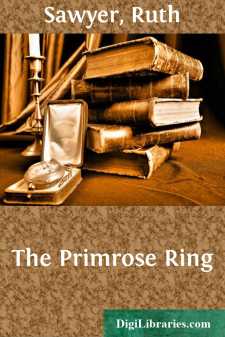Categories
- Antiques & Collectibles 13
- Architecture 36
- Art 48
- Bibles 22
- Biography & Autobiography 813
- Body, Mind & Spirit 142
- Business & Economics 28
- Children's Books 15
- Children's Fiction 12
- Computers 4
- Cooking 94
- Crafts & Hobbies 4
- Drama 346
- Education 46
- Family & Relationships 57
- Fiction 11828
- Games 19
- Gardening 17
- Health & Fitness 34
- History 1377
- House & Home 1
- Humor 147
- Juvenile Fiction 1873
- Juvenile Nonfiction 202
- Language Arts & Disciplines 88
- Law 16
- Literary Collections 686
- Literary Criticism 179
- Mathematics 13
- Medical 41
- Music 40
- Nature 179
- Non-Classifiable 1768
- Performing Arts 7
- Periodicals 1453
- Philosophy 64
- Photography 2
- Poetry 896
- Political Science 203
- Psychology 42
- Reference 154
- Religion 513
- Science 126
- Self-Help 84
- Social Science 81
- Sports & Recreation 34
- Study Aids 3
- Technology & Engineering 59
- Transportation 23
- Travel 463
- True Crime 29
The Primrose Ring
by: Ruth Sawyer
Categories:
Description:
Excerpt
I
CONCERNING FANCY AND SAINT MARGARET'S
Would it ever have happened at all if Trustee Day had not fallen on the 30th of April—which is May Eve, as everybody knows?
This is something you must ask of those wiser than I, for I am only the story-teller, sitting in the shadow of the market-place, passing on the tale that comes to my ears. But I can remind you that May Eve is one of the most bewitched and bewitching times of the whole year—reason enough to account for any number of strange happenings; and I can point out to your notice that Margaret MacLean, in charge of Ward C at Saint Margaret's, found the flower-seller at the corner of the street that morning with his basket full of primroses. Now primroses are "gentle flowers," as everybody ought to know—which means that the faeries have been using them for thousands of years to work magic; and Margaret MacLean bought the full of her hands that morning.
And this brings us back to Trustee Day at Saint Margaret's—which fell on the 30th of April—and to the beginning of the story.
Saint Margaret's Free Hospital for Children does not belong to the city. It was built by a rich man as a memorial to his son, a little crippled lad who stayed just long enough to leave behind as a legacy for his father a great crying hunger to minister to all little ailing and crippled bodies. There are golden tales concerning those first years of the hospital—tales passed on by word of mouth alone and so old as to have gathered a bit of the misty glow of illusion that hangs over all myths and traditions. They made of Saint Margaret's an arcadian refuge, where the Founder wandered all day and every day like a patron saint. Tradition endowed him with all the attributes of all saints belonging to childhood: the protectiveness of Saint Christopher, the tenderness of Saint Anthony, the loving comradeship of Saint Valentine, and the joyfulness of Saint Nicholas.
But that was more than fifty years ago; and institutions can change marvelously in half a century. Time had buried more than the Founder.
The rich still support Saint Margaret's. Society gives bazars and costumed balls for it annually; great artists give benefit concerts; bankers, corporation presidents, and heiresses send liberal checks once a year—and from this last group are chosen the trustees. They have made of Saint Margaret's the best-appointed hospital in the city. It is supplied with everything money and power can obtain; leading surgeons are listed on its staff; its nurses rank at the head. It has outspanned the greatest dream of the Founder—professionally. And twelve times a year—at the end of every month—the trustees hold their day; which means that all through the late afternoon, until the business meeting at five-thirty, they wander over the building.
Now it is the business of institutional directors to be thorough, and the trustees of Saint Margaret's, previous to the 30th of April, never forgot their business. They looked into corners and behind doors to see what had not been done; they followed the work-trails of every employee—from old Cassie, the scrub-woman, to the Superintendent herself; and if one was a wise employee one blazed conspicuously and often....



